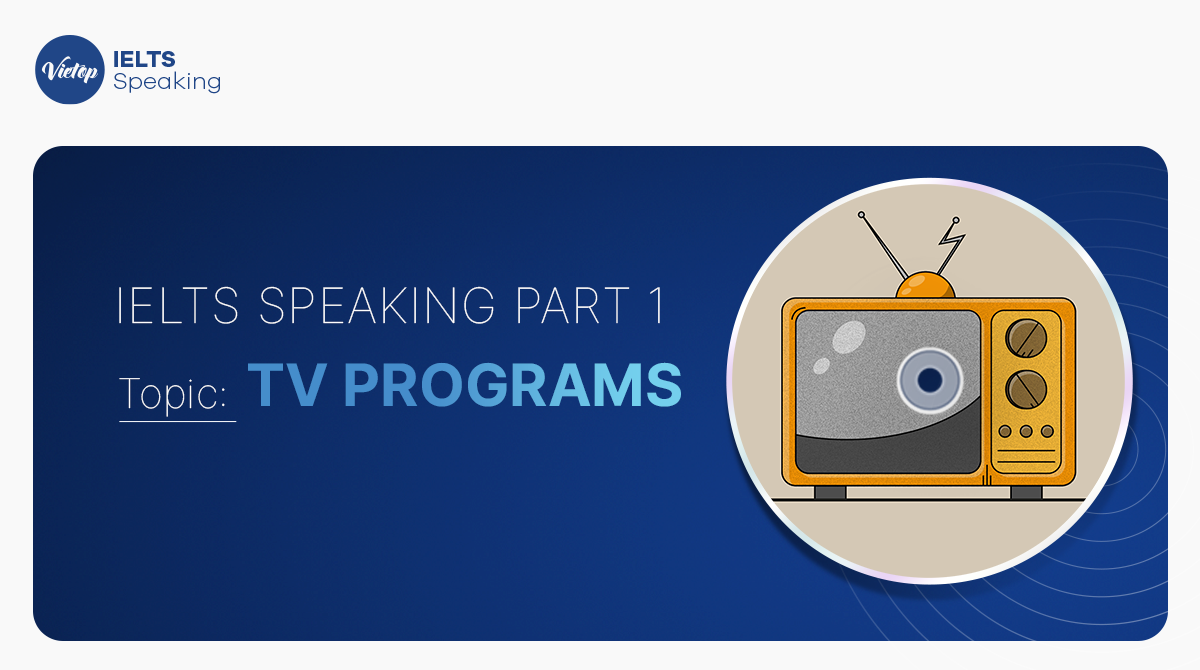Hôm nay VIETOP sẽ mang đến cho các bạn một chủ đề Speaking part 1 khá thú vị, đó là “TV programs”.
Cùng xem và nghe bài mẫu dưới đây của VIETOP nhé!
Sample

1. What kind of TV programs do you like?
I love watching news on televisions as I want to be informed about what’s happening around me, especially in this tumultuous time of the Covid pandemic. I want to have information that can be used to keep me and my family safe.
- tumultuous (adj): biến động
- What’s your favorite TV program?
I prefer watching news programs on either BBC or CNN. The advantage of watching news on these channels is that they speak in a clear and precise manner. I can learn a lot on how to use formal language watching the presenters on these two channels.
- precise (adj): chính xác
2. Do you often watch programs on TV or your cell phone?
I find myself watching more and more content on my cell phone on the bus or at lunches rather than watching TV in my living room. It is just more convenient. Most of these programmes are also free, so I’m thinking of cutting the cord to just watch these programs exclusively on my personal devices.
- Cutting the cord (expression, noun phrase): việc từ bỏ không sử dụng cáp truyền hình nữa
3. Do you like watching the same kind of program all the time?
Well, after a while, news can bore me out and the severity of some news can take a toll on my mental health. Therefore, every now and then I also choose to watch sitcom series such as “How I met your mother” and the likes because the humour is lighthearted and suitable for relaxation.
- to bore someone out (expression): làm ai đó chán
- severity (n): mức độ nghiêm trọng
- to take a toll on someone/something (expression): gây thiệt hại cho ai đó/cái gì đó
- sitcom (n): phim truyền hình nhiều tập về hài tình huống.
Audio
Xem thêm:
- Top 42 chủ đề IELTS Speaking Part 1 thông dụng nhất
- Mách bạn chiến lược làm bài Speaking Part 1 hiệu quả
- Loại câu hỏi quen thuộc trong IELTS Speaking Part 1
Hy vọng bài mẫu trên sẽ giúp ích được cho bạn trong quá trình luyện thi IELTS. Chúc các bạn thi thật tốt.
IELTS VIETOP
source https://www.ieltsvietop.vn/tu-hoc-ielts/topic-tv-programs-ielts-speaking-part-1/
1xbet - No 1xbet Casino | Live dealer casino online
Trả lờiXóa1xbet is a worrione.com reliable casino site herzamanindir.com/ that offers a 1xbet korean great casino 토토 사이트 홍보 games from the best software providers for the regulated gambling markets. Rating: 8/10 · Review by poormansguidetocasinogambling a Tripadvisor user · Free · Sports